PRIME: innovative test laboratory for soil and water decontamination
Your challenges and needs
The PRIME platform responds to practical needs and issues linked to the monitoring and decontamination of water, soil and the subsurface. PRIME acts as an intermediate link between laboratories and contaminated sites, and develops, qualifies and validates various tools and methods at different scales, such as:
- Environmental metrology tools (sensors, samplers, etc.) to identify and quantify pollution in the soil, subsurface and groundwater;
- Models to predict the potential impact of a given type of contamination on the environment, in the short and medium term (degradation, storage, transfer, etc.);
- Innovative and environmentally-friendly remediation methods and processes (physical, chemical and biological).
PRIME's experimentation facilities are housed in a purpose-built 1,000m² hall located near BRGM's analytical facilities. PRIME is a facility classified for environmental protection (ICPE) and therefore gives industrial and academic partners the opportunity to develop and test remediation solutions for potentially hazardous substances.
Discover our virtual tour of the PRIME platform
Our added value
The management of polluted sites and soils is crucial from an environmental as well as from a health and economic perspective. BRGM's PRIME platforms in Orléans are experimental facilities with 3 objectives:
- identify and quantify ground, subsurface and groundwater pollution,
- predict their potential impact on our environment in the short and medium term,
- propose solutions (tools and methods) for remediating and studying the affected areas.
PRIME platforms carry out multi-contaminant (inorganic and organic), multi-matrix (soil, sediment, water, rock) and multi-method (physical, chemical, biological) studies.
PRIME has already contributed to the understanding and rehabilitation of environments polluted by hydrocarbons (petrol station leaks for example), chlorinated solvents (used in dry cleaning, degreasing for metallurgy, etc.), pesticides (in crops) and heavy metals (linked to industrial and mining activities).
Its platforms are also developing innovative eco-technologies, for example using the properties of micro-organisms or nanoparticles to clean up pollution.
Understanding how PRIME laboratories work
Transcription
In France, over 7,200 sites are polluted with heavy metals: lead, copper, chrome, hydrocarbons, or organochlorine compounds, such as pesticides or solvents. Managing the sites and the polluted soil is a major environmental issue, but it is also a health and economic issue. The PRIME initiative, which is part of the PIVOTS programme, aims to identify and quantify pollutants in soil and underground water, to predict their impact on our environment, and to create solutions for remediation. What makes PRIME unique is that it works on multiple scales, enabling a global approach, closely linking lab and field, and enriching experimentation with modelling. The submetric columns, ranging from 20 cm to 1 metre, are used in the lab to carefully study the physical, biological and chemical changes in pollutants. The data gathered at this scale are used to interpret more complex observations carried out via vaster systems. The metric columns provide a smaller scale and controlled model of a polluted zone from the surface soil down to the groundwater. They allow us to characterize the exchanges between environments, such as the root systems and the groundwater, in great depth. The Labbio system enables us to study the migration of and changes to pollutants from soil to underground water as a function of surface conditions. The Trinappe system allows us to study the interaction between the different zones of groundwater. In this unit, water circulates from surface to the depths, but it can also rise to simulate a water-table rise. This innovative system is a unique tool for gathering data on phenomena that are difficult to study in real life. These different systems have sensors which measure flows of pollutants that have been stabilized, transformed or washed. These are ideal places for developing new quantification technology. The multi-metric system was designed to reproduce polluted sites or soil under controlled conditions and at a scale similar to that of the real world. It is thus an ideal system for developing diagnostic tools and remediation techniques. This tool can also verify digital models. This unit is a vast experimental reservoir. It is about 150 m3 in volume and has double walls to regulate the reservoir's temperature. The hood above the reservoir allows for experimentation with plants and helps control potential flows of volatile pollutants. The reservoir's walls feature holes that can be fitted with sensors and provide access to various depths inside the reservoir, all along the unit. The system's configuration allows the reservoir to be split into up to 4 modules filled with different materials, water, sand, polluted or unpolluted soil, mining residues, sediments, etc., in order to conduct simultaneous experiments. These modules are formed by walls and dividers made of alloy, which resists corrosive pollutants, or of polypropylene, which can be used with electrical geophysical methods. The modularity and unique traits of the unit make it a one-of-a-kind system in Europe. As well as these systems, the PRIME initiative brings together expert teams from BRGM, who are ready to work with public and private partners on innovation and development, from design to execution and promotion, in the Centre region, in France and abroad, in order to better understand and preserve our environment.
BRGM's PRIME platform in Orléans
A unique system in Europe for studies on different scales
PRIME makes it possible to carry out experiments at different scales:
- At small scales (a few kg or cm3 of soil, sediment or liquids). Each parameter (temperature, pollutant concentration, etc.) can be checked and its precise role identified.
- At a large scale (several tonnes or tens of m3). This allows for more realistic conditions that are close to those encountered in the field.
The Plurimetric Pilot (PPM)
The PRIME plurimetric pilot is a large facility simulating natural ground and groundwater for studying the transport of pollutants and the physicochemical and microbiological changes they undergo. The plurimetric pilot plant is highly modular and includes numerous sensors. It is designed to enable any users, including research institutions and private companies, to carry out experiments under the most realistic conditions possible, but that are far better controlled.
This pilot facility is a large experimental tank (10.40 m long, 3.6 m wide and 4 m high). With an effective volume of approximately 120 m³, reaction processes occurring in areas that are unsaturated and saturated with water can be analysed on a large scale and in 3D. The tank’s walls are equipped with access holes that offer the possibility of installing sensors or more widely measuring at different depths all around the facility for the duration of the test.
The metric platform
The metric columns simulate, at an intermediate scale, the polluted environment from the ground surface down to the groundwater table. The LABBIO pilot facility can be used to study the migration of pollutants between these different levels, but also to develop techniques for neutralising or stabilising pollutants.
The TRINAPPE metric pilot enables the study of interactions between different groundwater levels. In this pilot, the water circulation is fully controlled, so that it can flow from the surface to the bottom, but also simulate a rising water table.
This platform is an exceptional innovative facility for improving our understanding of the phenomena taking place between the different compartments or environments of the ground and subsurface.
The submetric platform
Experiments conducted at the centimetre scale are carried out in columns or vats. They allow precise measurement of a given phenomenon, such as the degradation of pollutants by micro-organisms and absorption processes. Submetric pilot facilities allow the identification of transport mechanisms in the ground and its different components, which is more difficult at larger scales.
The range of action of a pollutant pump can be studied in the tanks and monitored by imaging and geophysical methods. These tests can be carried out under different temperature conditions or with the addition of chemical compounds (surfactants, foams, etc.) to optimise the recovery of pollutants.
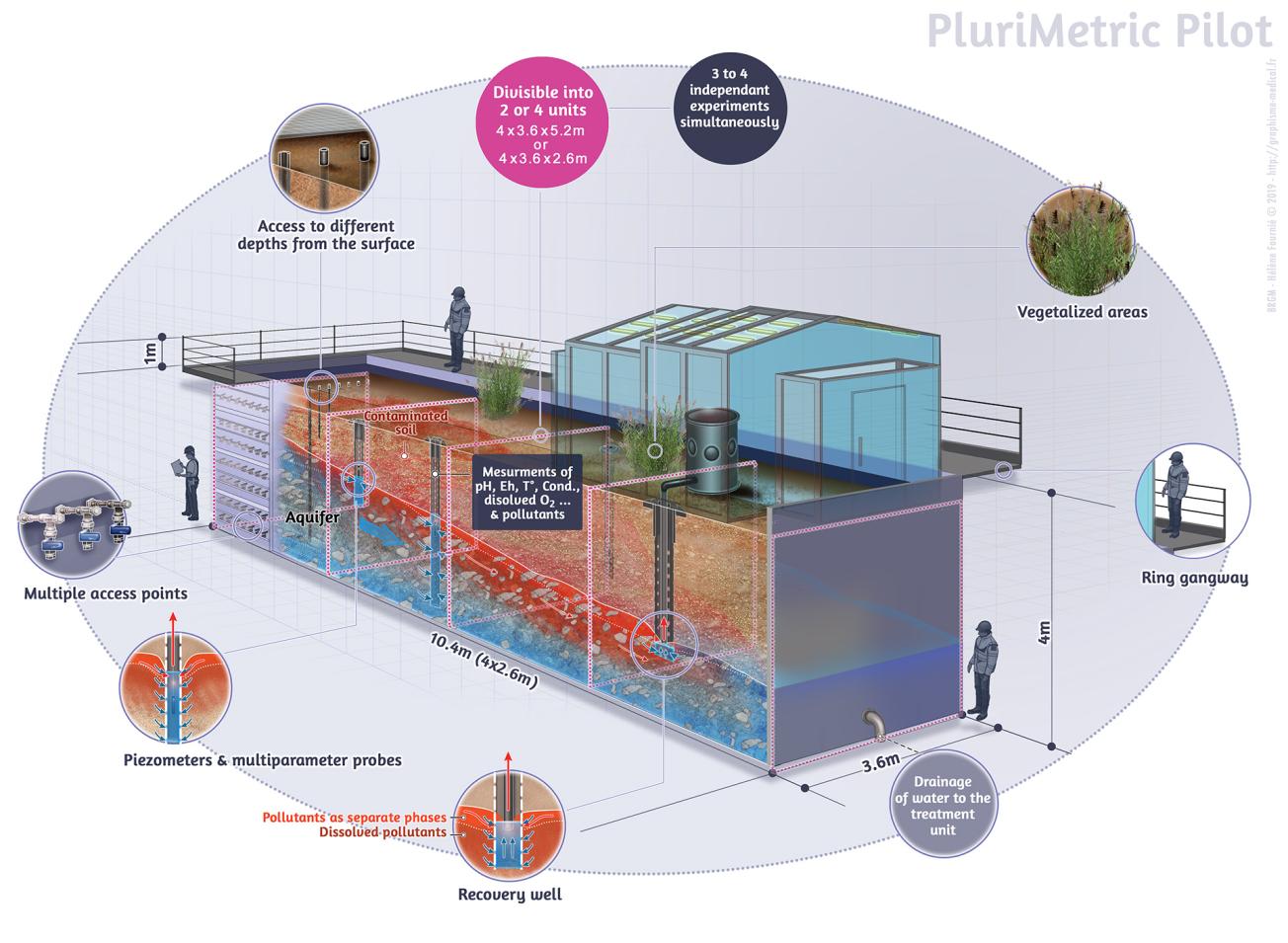
PRIME, a research and innovation platform for environmental metrology. A plurimetric experimental pilot.
© BRGM - Hélène Fournié
Fields of application
Environmental metrology
- Simulating groundwater circulation for testing sensors and passive samplers.
Migration and fate of contaminants in soils, rocks and groundwater
- Management and optimisation of excavated materials from work on the Greater Paris Express Metro line;
- Understanding the mechanisms that control the distribution of metallic contaminants between river water and sediments when they are released back into suspension;
- Studying the behaviour of waste treatment residues (bottom ash) and slag from metal production;
- Studying the transfer of organic contaminants (pesticides, pharmaceutical compounds, body-care products, degradation products, metabolites, etc.) in the environment.
Physico-chemical or biological remediation tools and processes
- Selecting the appropriate plant cover to rehabilitate industrial wastelands;
- Development of passive mine water treatment facilities;
- Development of a bioprocess for pesticide degradation based on the use of active microbial communities;
- Using foam to treat groundwater contaminated by heavy chlorinated compounds.
Resources that can be mobilised for different types of projects
BRGM provides the skills and know-how of a team of technicians, engineers, researchers and business managers to meet your needs, from fundamental research to product or service validation (TRL 1 to 9).
All PRIME's resources can be mobilised within the framework of:
- Collaborative research projects (design, implementation, transfer) with regional, national or European funding.
- Services at different levels of the value chain.
- Possibilities for development, testing or validation of methods and equipment.
- Training/demonstration.
Technical resources
- Centimetre-to-decimetre-scale batch reactors (closed containers);
- Decimetre-to-metre-sized tanks and columns (height 0.2 to 5 m, internal diameter 0.05 to 1 m);
- Modular multi-metric pilot facility of 150m3 (length 11 m, section 4 x 4 m); only one of its kind in France;
- Tailor-made pilot-facility assembly area, according to the needs of the experiment;
- Equipment for monitoring physical, chemical and microbiological measurements and samples (water, gas, solids) adapted to all the space and time scales studied;
- Laboratory environment for chemical (organic and inorganic), isotope and mineralogical analyses.
Digital resources
- Thermoddem database (thermodynamics/kinetics of natural processes and reactive transport of pollutants).
Human resources
- A multidisciplinary team of around thirty engineers, researchers and technicians (experiment designers, hydrogeologists, hydro-geochemists, microbiologists, process engineers, field monitoring technicians, etc.).

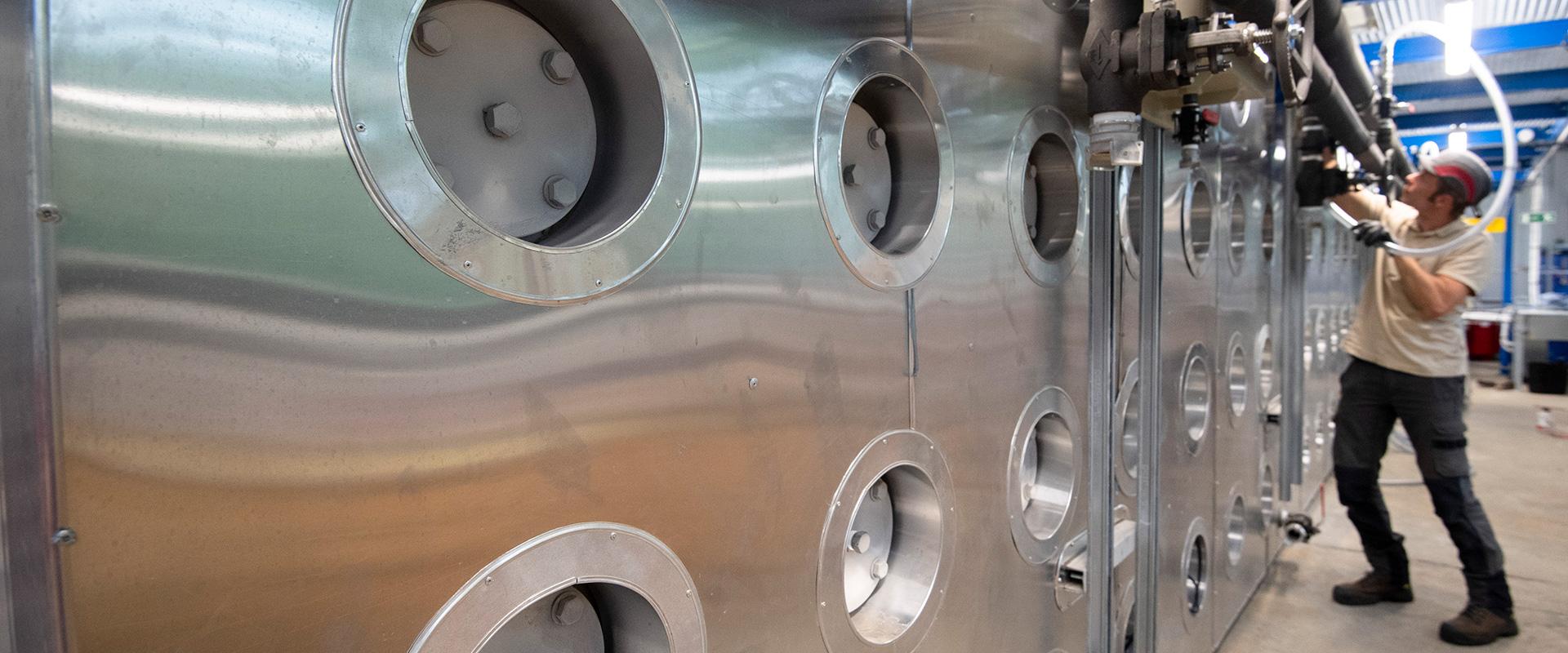
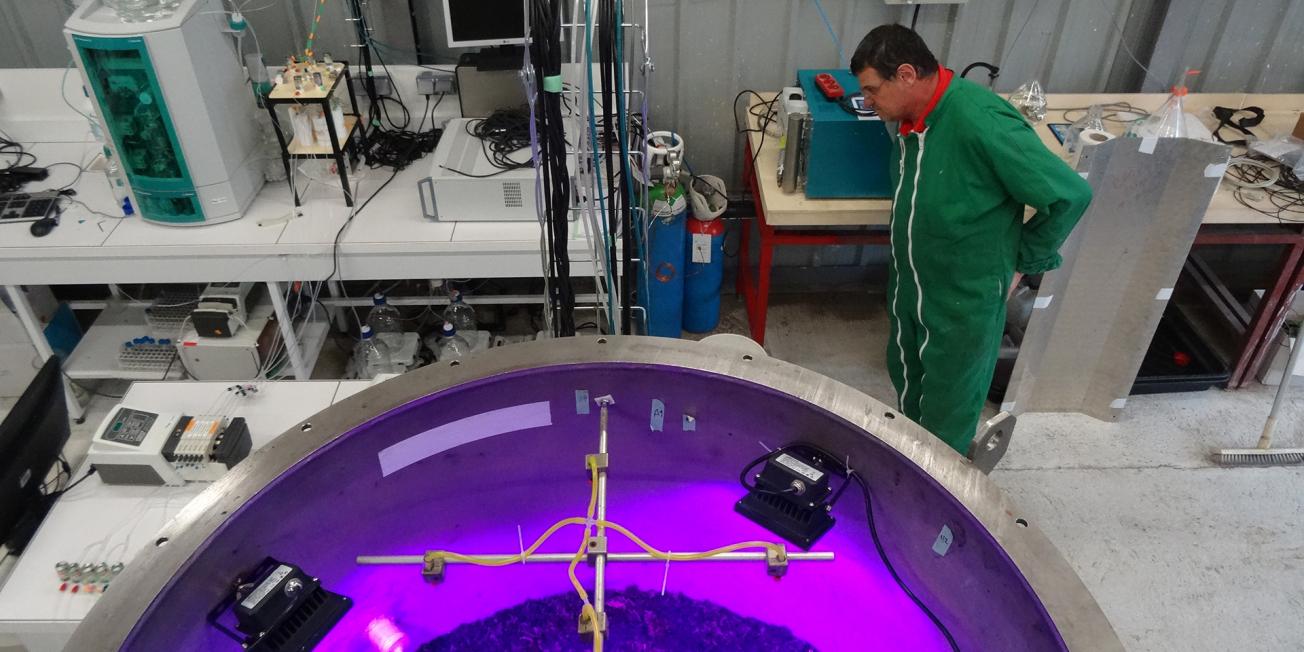
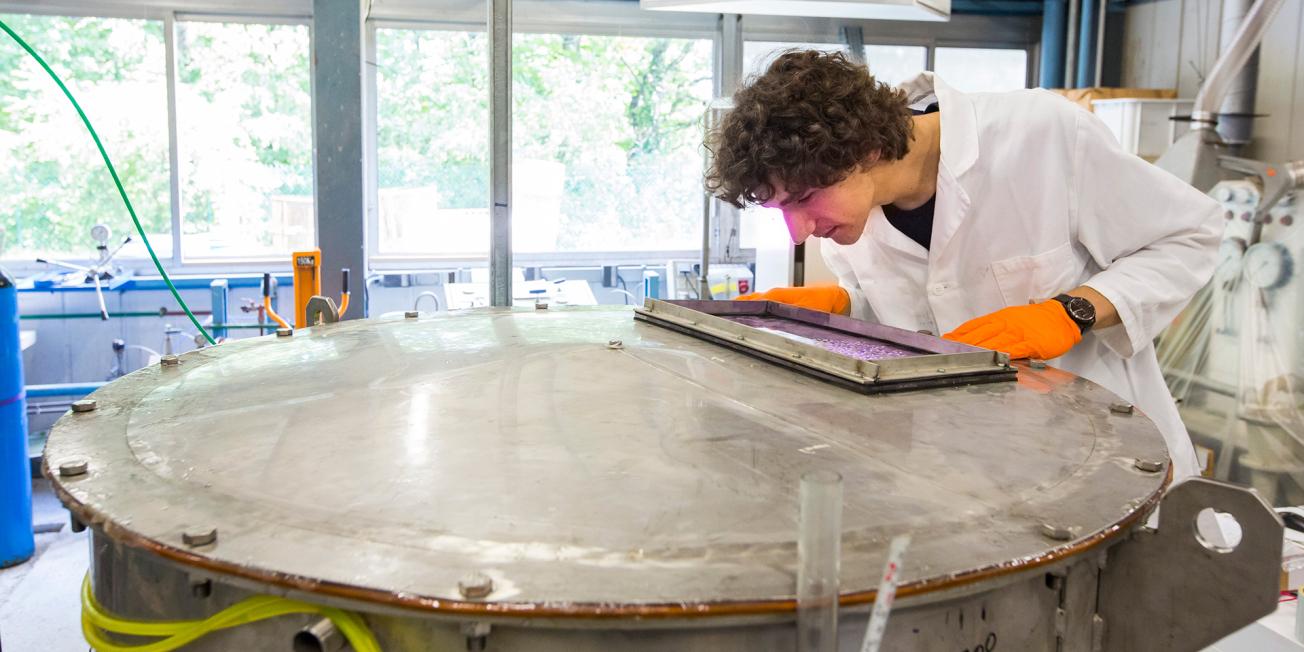
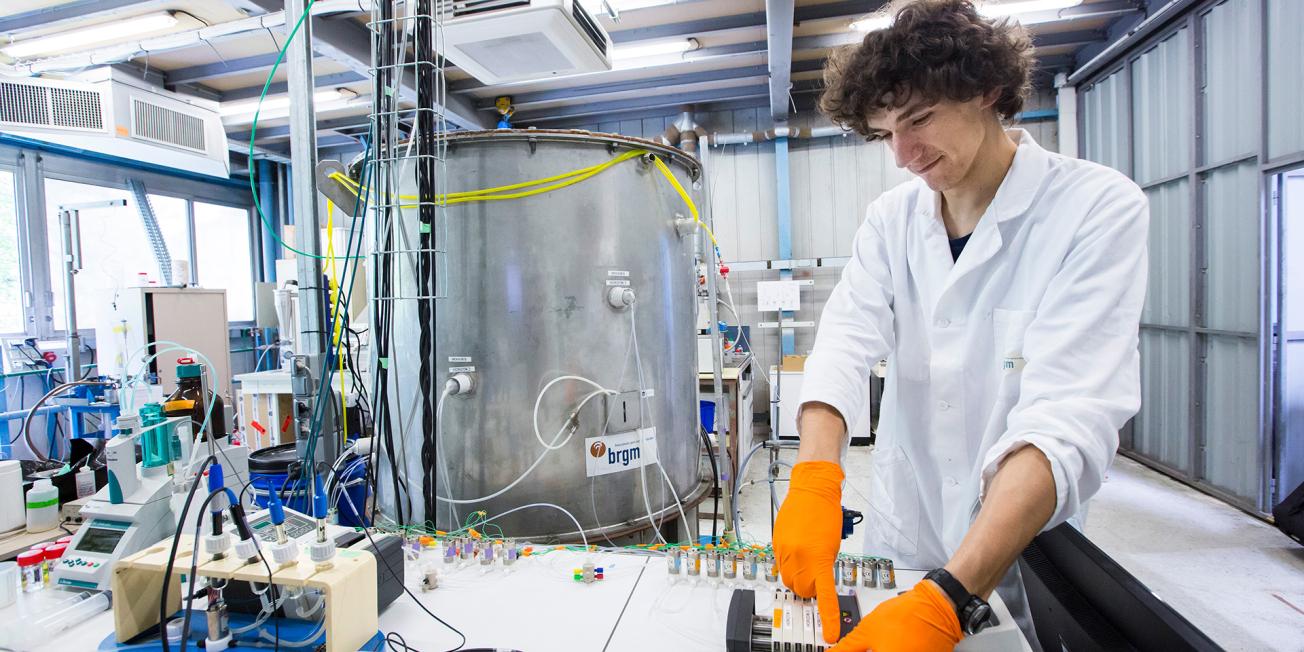
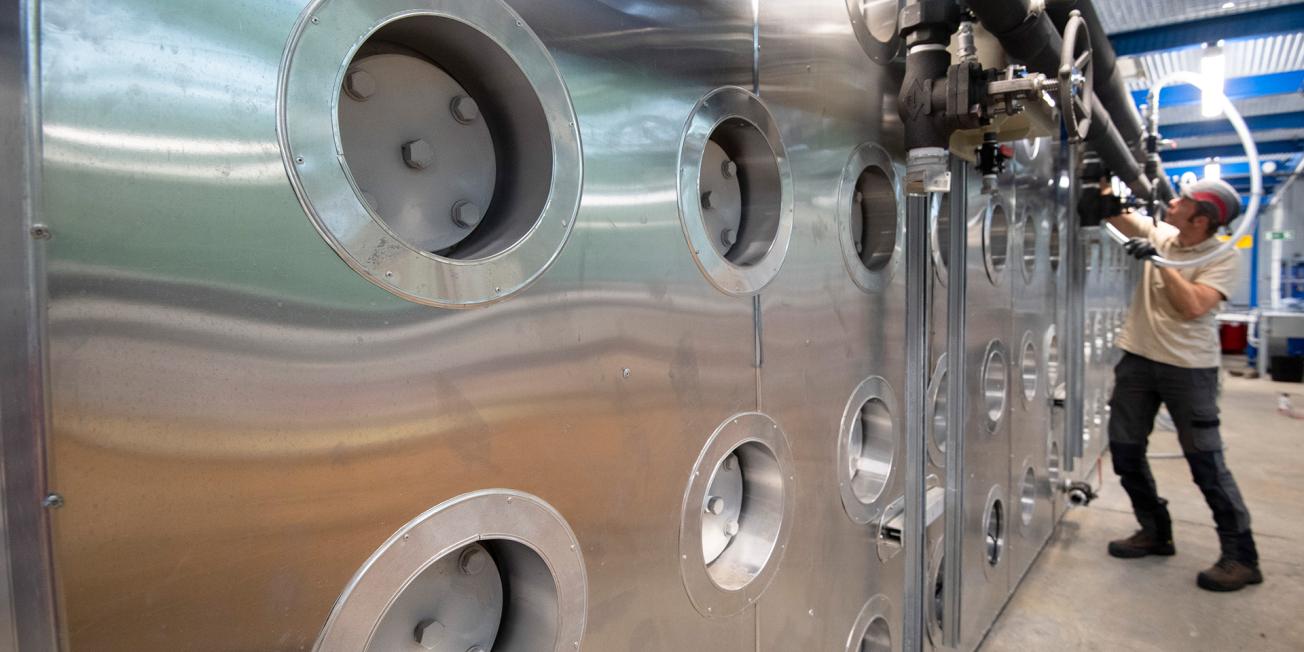
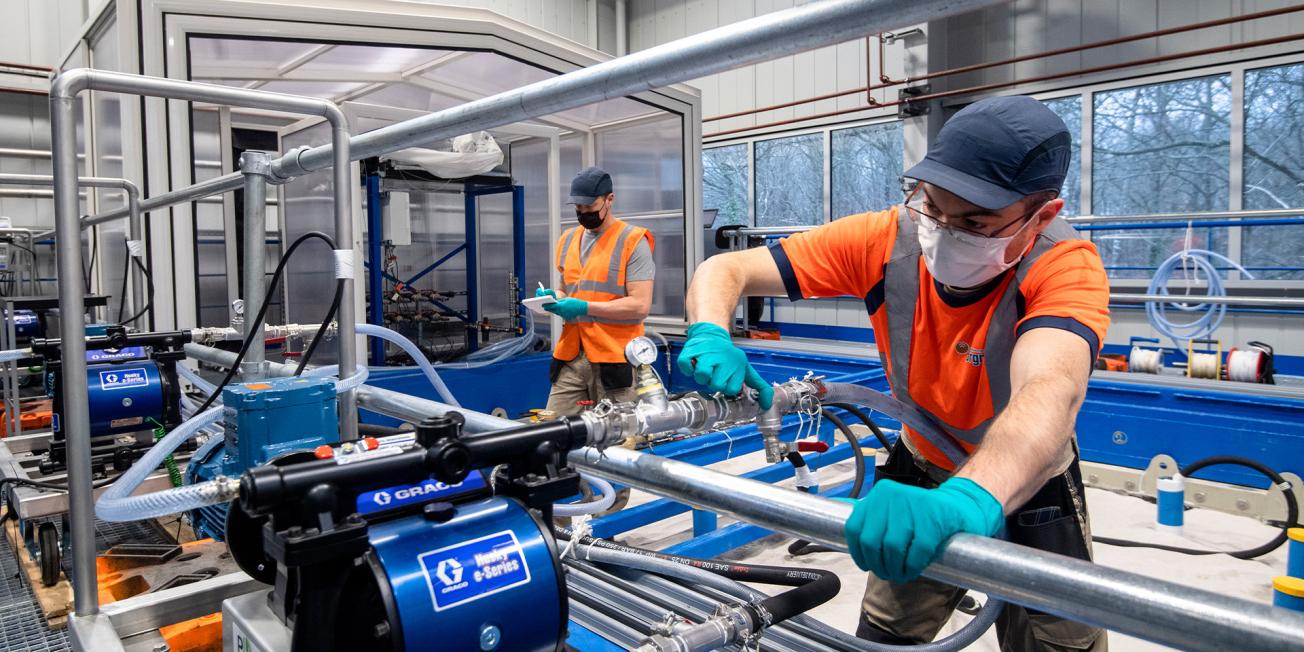
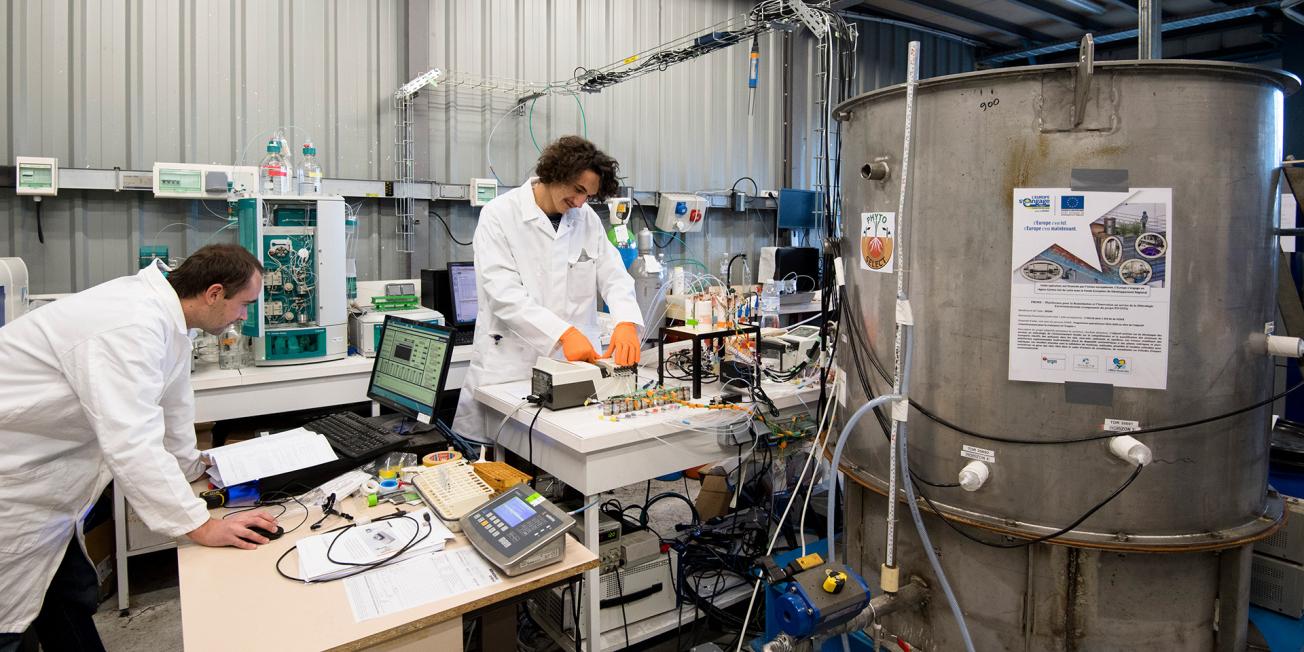
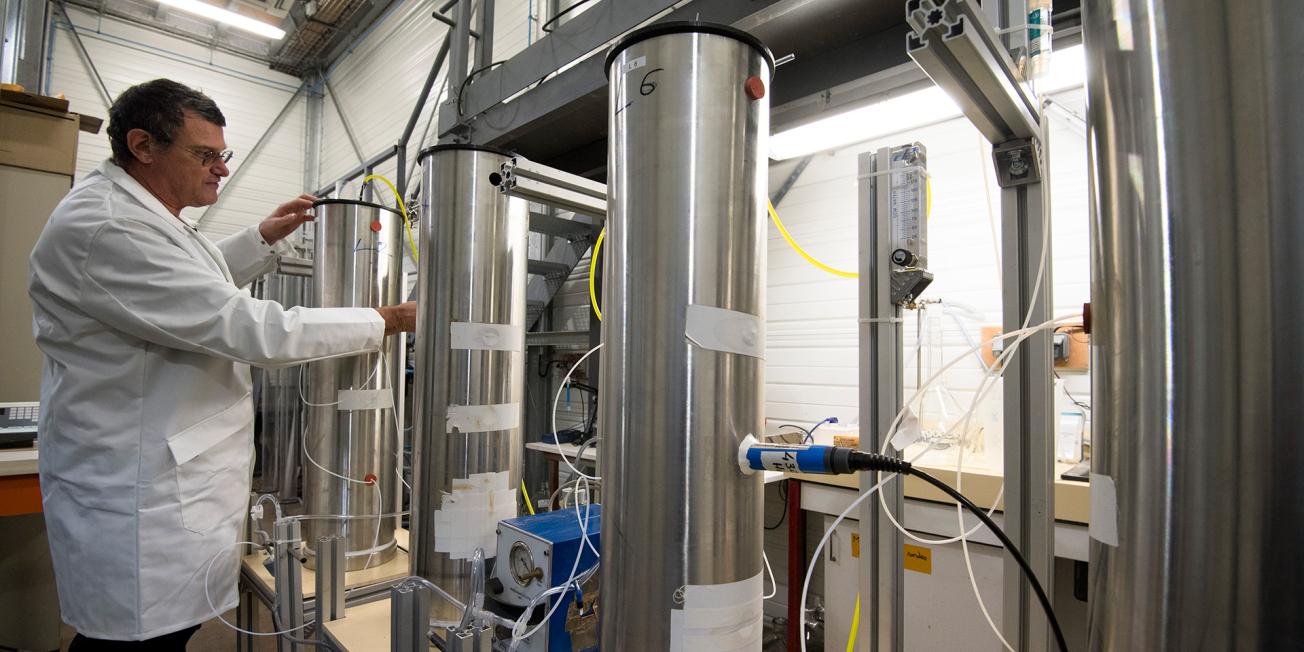
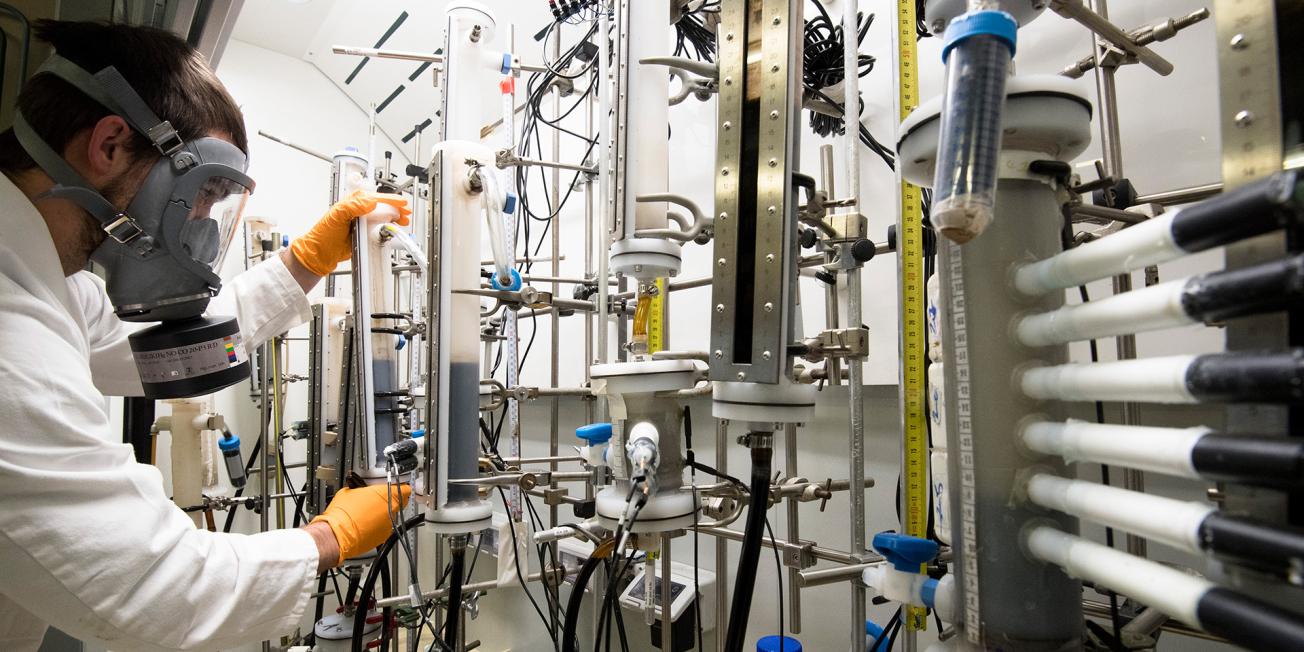
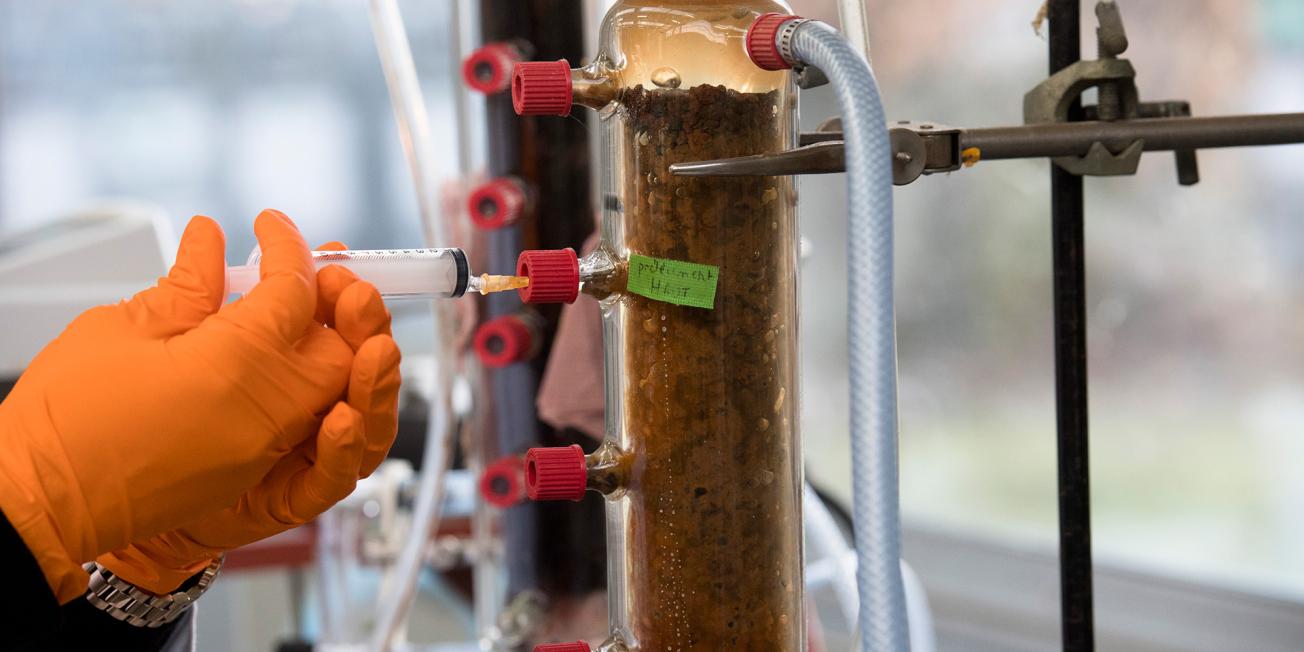
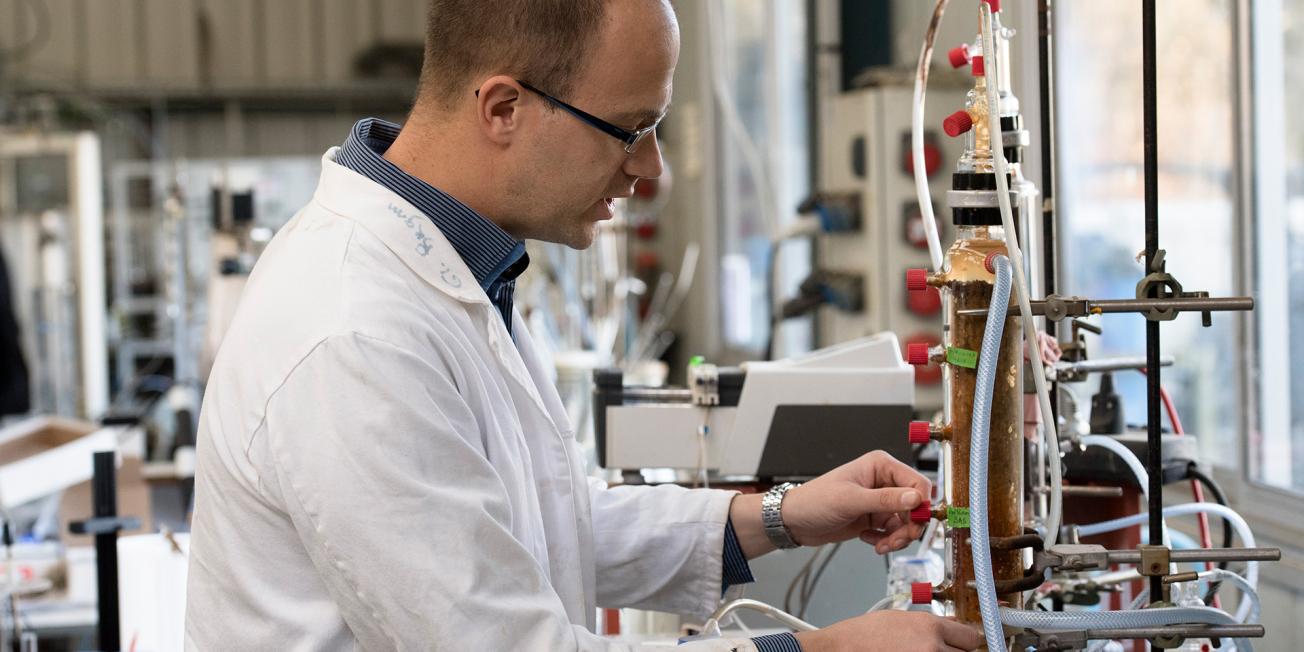
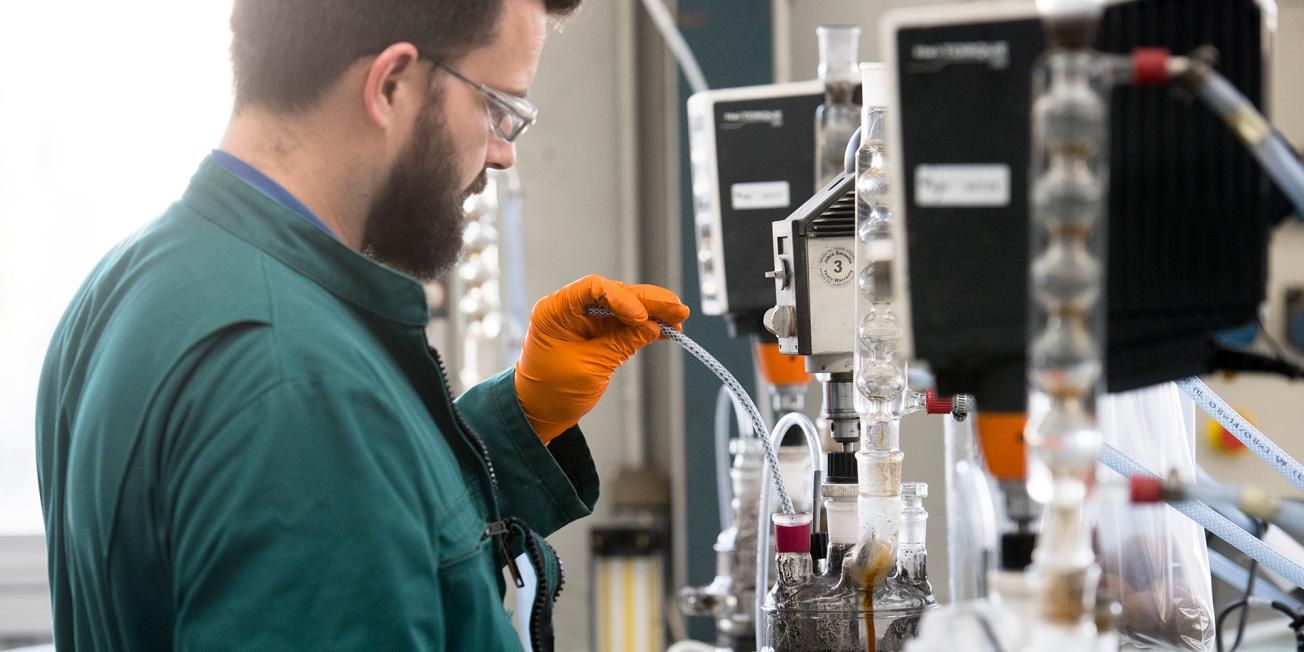
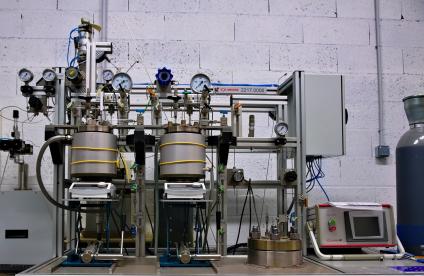
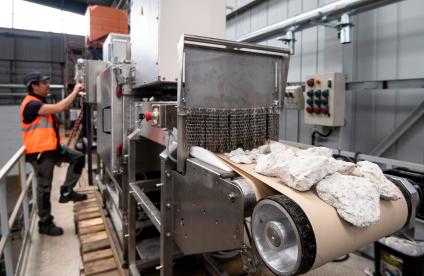
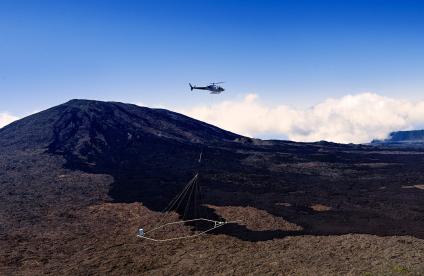
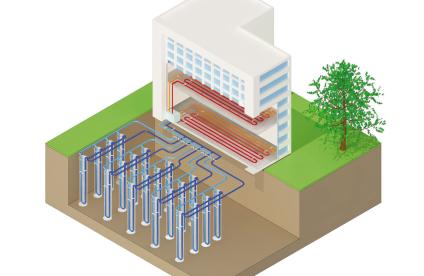
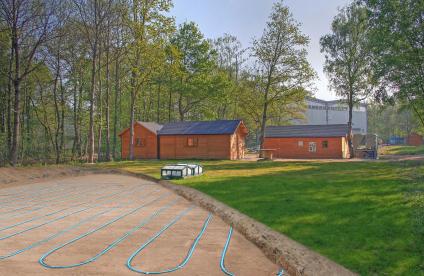
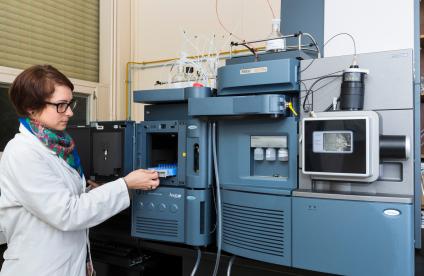
The aim of PRIME is to identify and measure soil and groundwater pollution, predict its potential and its impact on our environment, and provide decontamination solutions. The platform has 3 pilot measurement columns, ranging from sub-metric to plurimetric. This system is unique in Europe and open to all French and international public and private organisations to help them develop innovations designed to preserve the environment.